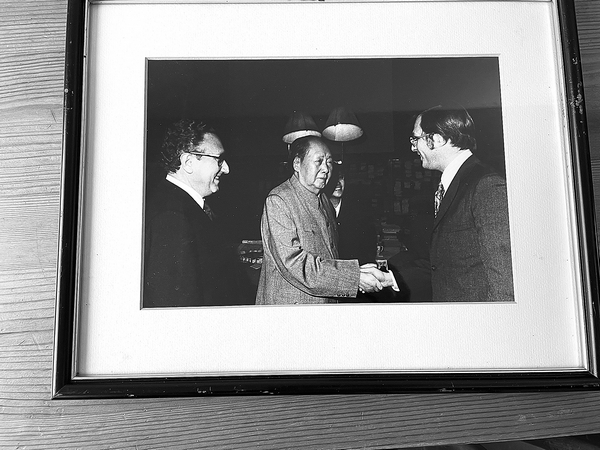

"We were scheduled to gather for a plenary session to kick off the proposed counterpart discussions," wrote Nicholas Platt in his 2009 book China Boys: How U. S. Relations with the PRC Began and Grew. "It was abruptly postponed, and we waited-and waited-and waited," Platt, who on that trip was the special assistant to the US secretary of state William Rogers, told China Daily."The secretary of state was not included and, to my knowledge, not even aware of the meeting."
Fourteen months after that meeting, Platt would find himself in Beijing again, to "physically build the US Liaison Office". The 85-year-old first learned Chinese in the early 1960s, hoping that some dramatic turnaround in US-China relations would one day put him "in the thick of things".
In the thick of things was exactly how Lord felt when he, with Kissinger and two other Americans, crossed the Pakistani-Chinese border into Chinese airspace onboard Pakistani president Yahya Khan's plane. It was dawn on July 9, 1971, and the plane skirted the planet's second-tallest peak, Qiaogeli Feng, known as K2 in the West, which had reputedly killed about one out of five climbers who had tried to reach its summit.
"I was overwhelmed as much by the unraveling scenery as by the huge implications and repercussions that we were about to unleash together with the Chinese," said Lord, who "by my good fortune", was sitting ahead of all his fellow Americans on the plane at that point.
"I've said ever since then that I was the first American official to visit China since 1949. And Kissinger reluctantly agreed."
The main goal of what is known today as "Kissinger's secret trip to China" was to decide whether there would be a visit by Nixon. And Lord had been covertly preparing for that "mountaintop experience" for a year.
"If we got out in advance, those who were fiercely against any rapprochement with the Chinese, and the pro-Taiwan lobby, would be invading the White House," he reckoned. "The trip was kept a top secret, privy only to a select few." This meant that Lord had to gather for Kissinger a lot of briefing material from various bureaucracies, the CIA and State Department, for example, "in innocent ways". The material was kept in "special briefcases from the CIA with locks on them". (Later when the group went sightseeing in Beijing on "a very hot, mid-July day" during Kissinger's visit, Lord had to carry at least one of those heavy briefcases around.)
Today the best-known story from that trip was Kissinger's upset stomach. The national security adviser, on the last leg of a publicly announced trip that included Vietnam, Thailand, India and Pakistan, pleaded stomachache. While he was supposedly recuperating in a hill station, the Pakistanis, who had been acting as a major channel of communication between the Americans and the Chinese, ferreted him and his four-man group to an airport in Islamabad in the wee hours of July 9, 1971.
However, there is a twist to that story, Lord said.
"Ironically, Kissinger came down with a real stomachache in India, and covered this up as much as possible because he wanted to save his real illness until he arrived in Pakistan," said Lord, who also recalled, rather bemusedly, how Kissinger became "genuinely upset" once onboard the plane, realizing that whoever had packed his suitcase forgot to put in any extra shirt.
On July 15, four days after the secret visit, which in turn lasted for 49 hours, Nixon announced on US national TV that he planned to visit China "before May 1972", convinced that "all nations will gain from a reduction of tensions" between China and the US.